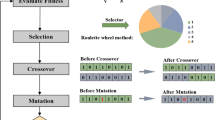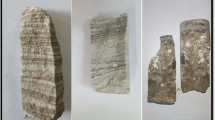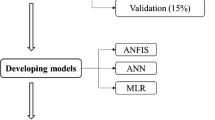Abstract
The tangential Young modulus (Eti) of intact rock is a critical parameter in engineering geological design calculations and rock mass classification systems. The Eti of various rock types has been successfully estimated by many studies based on numerous soft computing methods in recent years. However, these studies mainly involve a single analysis method or are valid for a limited number of samples. For this reason, this study aimed to compare artificial neural networks (ANN), adaptive neural fuzzy inference system (ANFIS), and Gene expression programming (GEP) methods to estimate the Eti of various rock types based on 147 datasets collected from the published literature. As a result of the soft computing analyses, three different predictive models were proposed in this study. In the proposed prediction models, rock properties such as dry density (ρd), effective porosity (ne), P-wave velocity (Vp), and uniaxial compressive strength (UCS) were used. The estimation performance of the proposed models was examined through several performance indices such as coefficient of determination (R2), root mean square error (RMSE), the variance accounted for (VAF), and mean absolute percent error (MAPE). As a result of statistical analyses, it was determined that the ANFIS model presents a better prediction performance (R2 = 0.967) than the other methods in the training datasets. On the other hand, the accuracy of the ANFIS model decreased significantly in the test datasets (R2 = 0.803). Furthermore, the GEP model presented the lowest predictive performance. Finally, considering the overall estimation accuracy of the proposed models, it was concluded that the proposed ANN model with an R2 of 0.94 could reliably be used to estimate the Eti of investigated rocks.









Similar content being viewed by others
Data availability
Enquiries about data availability should be directed to the authors.
References
Abdi Y, Khanlari GZ, Jmashidi A (2018) Correlation between mechanical properties of sandstones and P-wave velocity in different degrees of saturation. Geotech Geol Eng. https://doi.org/10.1007/s10706-018-0721-6
Abdulhadi NO, Barghouthi AF (2012). Measurement of stiffness of rock from laboratory and field tests. In: Proceedings of the 5th Jordanian international civil engineering conference 1–12, Amman, Jordan
Armaghani DJ, Mohamad ET, Momeni E, Narayanasamy MS, Amin MFM (2015) An adaptive neuro-fuzzy inference system for predicting unconfined compressive strength and Young’s modulus: a study on Main Range granite. Bull Eng Geol Environ 7:1301–1309. https://doi.org/10.1007/s10064-014-0687-4
Armaghani DJ, Mohamad ET, Momeni E et al (2016) Prediction of the strength and elasticity modulus of granite through an expert artificial neural network. Arab J Geosci 9:48. https://doi.org/10.1007/s12517-015-2057-3
Behzadafshar K, Sarafraz ME, Hasanipanah M et al (2019) Proposing a new model to approximate the elasticity modulus of granite rock samples based on laboratory tests results. Bull Eng Geol Environ 78:1527–1536. https://doi.org/10.1007/s10064-017-1210-5
Beiki M, Majdi A, Givshad A (2013) Application of genetic programming to predict the uniaxial compressive strength and elastic modulus of carbonate rocks. Int J Rock Mech Min Sci 63:159–169. https://doi.org/10.1016/j.ijrmms.2013.08.004
Bidgoli MN, Zhao Z, Jing L (2013) Numerical evaluation of strength and deformability of fractured rocks. Rock Mech Geotech Eng 5:419–430. https://doi.org/10.1016/j.jrmge.2013.09.002
Campbell C, Ying Y (2011) Learning with support vector machines. Synth Lectures Artif Intell Machine Learn 5(1):1–95. https://doi.org/10.2200/S00324ED1V01Y201102AIM010
Das SK (2013) Artificial neural networks in geotechnical engineering: modeling and application issues, Metaheuristics in water, geotechnical and transport engineering, 231–270.
Dehghan S, Sattar GH, Chehreh CS, Aliabadi MA (2010) Prediction of unconfined compressive strength and modulus of elasticity for Travertine samples using regression and artificial neural networks. Mining Sci Technol (Chin) 20(1):41–46. https://doi.org/10.1016/S1674-5264(09)60158-7
Diamantis K, Bellas S, Migiros G et al (2011) Correlating wave velocities with physical, mechanical properties and petrographic characteristics of peridotites from the central Greece. Geotech Geol Eng 29:1049–1062. https://doi.org/10.1007/s10706-011-9436-7
Dinçer I, Acar A, Çobanoğlu I, Uras Y (2004) Correlation between Schmidt hardness, uniaxial compressive strength and Young’s modulus for andesites, basalts and tuffs. Bull Eng Geol Environ 63:141–148. https://doi.org/10.1007/s10064-004-0230-0
Ferreira C (2001) Gene expression programming: a new adaptive algorithm for solving problems. Complex Syst 13(2):87–129
Gokceoglu C, Yesilnacar E, Sonmez H, Kayabasi A (2004) A neuro-fuzzy model for modulus of deformation of jointed rock masses. Comput Geotech 31(5):375–383. https://doi.org/10.1016/j.compgeo.2004.05.001
Gökceoglu C, Zorlu K (2004) A fuzzy model to predict the uniaxial compressive strength and the modulus of elasticity of a problematic rock. Eng Appl Artif Intell 17(1):61–72. https://doi.org/10.1016/j.engappai.2003.11.006
Goodman RE (1989) Introduction to rock mechanics, 2nd edn. Wiley, New York
Heidari M, Khanlari GR, Momeni AA (2010) Prediction of elastic modulus of ıntact rocks using artificial neural networks and non-linear regression methods. Aust J Basic Appl Sci 4(12):5869–5879
Hoek E, Diederichs MS (2006) Empirical estimation of rock mass modulus. Int J Rock Mech Min Sci 43:203–215. https://doi.org/10.1016/j.ijrmms.2005.06.005
Jang JSR (1992) Neuro-fuzzy modeling: architecture, analyses and applications, dissertation, department of electrical engineering and computer science, University of California, Berkeley, CA 94720.
Kahraman S, Gunaydin O, Alber M, Fener M (2009) Evaluating the strength and deformability properties of Misis fault breccia using artificial neural networks. Expert Syst Appl 36:6874–6878. https://doi.org/10.1016/j.eswa.2008.08.002
Karakuş A, Akatay M (2013) Determination of basic physical and mechanical properties of basaltic rocks from P-wave velocity. Nondestruct Test Eval 28:342–353. https://doi.org/10.1080/10589759.2013.823606
Kayabasi A, Gokceoglu C, Ercanoglu E (2003) Estimating the deformation modulus of rock masses: a comparative study. Int J Rock Mech and Min Sci 40:55–63. https://doi.org/10.1016/S1365-1609(02)00112-0
Kecman V. (2001) Learning and soft computing: support vector machines, neural networks, and fuzzy logic models, MIT Press, ISBN: 9780262256513
Köken E (2020) Investigations on fracture evolution of coal measure sandstones from mineralogical and textural points of view. Indian Geotech J 50:1024–1040. https://doi.org/10.1007/s40098-020-00427-1
Köken E (2021) Assessment of deformation properties of coal measure sandstones through regression analyses and artificial neural networks. Arch Min Sci 66(4): 523 542. https://doi.org/10.24425/ams.2021.139595
Lashkaripour GR (2002) Predicting mechanical properties of mudrock from index parameters. Bull Eng Geol Environ 61:73–77. https://doi.org/10.1007/s100640100116
Madhubabu N, Singh PK, Kainthola A, Mahanta B, Tripathy A, Singh TN (2016) Prediction of compressive strength and elastic modulus of carbonate rocks. Measurement 88:202–213. https://doi.org/10.1016/j.measurement.2016.03.050
Mitri HS, Edrissi R, Henning J (1994) Finite element modelling of cable bolted stopes in hard rock ground mines. In: Presented at the SME Annual Meeting. New Mexico, Albuquerque, pp 94–116.
Mokhtari M, Behnia M (2019) Comparison of LLNF, ANN, and COA-ANN techniques in modeling the uniaxial compressive strength and static Young’s modulus of limestone of the Dalan formation. Nat Resour Res 28:223–239. https://doi.org/10.1007/s11053-018-9383-6
Moradian ZA, Behnia M (2009) Predicting the uniaxial compressive strength and static Young’s modulus of intact sedimentary rocks using the ultrasonic test. Int J Geomech 9(1):14–19. https://doi.org/10.1061/(ASCE)1532-3641(2009)9:1(14)
Nicholson GA, Bieniawski ZT (1990) A nonlinear deformation modulus based on rock mass classification. Int J Min Geol Eng 8:181–202. https://doi.org/10.1007/BF01554041
Nicodemus KK, Malley JD (2009) Predictor correlation impacts machine learning algorithms: implications for genomic studies. Bioinformatics 25(15):1884–1890. https://doi.org/10.1093/bioinformatics/btp331
Pappalardo G (2015) Correlation between P-Wave velocity and physical–mechanical properties of intensely jointed dolostones, Peloritani Mounts, NE Sicily. Rock Mech Rock Eng 48:1711–1721. https://doi.org/10.1007/s00603-014-0607-8
Rabbani E, Sharif F, Koolivand Salooki M, Moradzadeh A (2012) Application of neural network technique for prediction of uniaxial compressive strength using reservoir formation properties. Int J Rock Mech Min Sci 56:100–111. https://doi.org/10.1016/j.ijrmms.2012.07.033
Ramamurthy T (2004) A geo-engineering classification for rocks and rock masses. Int J Rock Mech Min Sci 41(1):89–101. https://doi.org/10.1016/S1365-1609(03)00078-9
Roy DH, Singh TN (2020) Predicting deformational properties of Indian coal: soft computing and regression analysis approach. Measurement 149:106975. https://doi.org/10.1016/j.measurement.2019.106975
Shalabi F, Cording EJ, Al-Hattamleh OH (2007) Estimation of rock engineering properties using hardness tests. Eng Geol 90(3–4):138–147. https://doi.org/10.1016/j.enggeo.2006.12.006
Sharma LK, Vishal V, Singh TN (2017) Developing novel models using neural networks and fuzzy systems for the prediction of strength of rocks from key geomechanical properties. Measurement 102:158–169. https://doi.org/10.1016/j.measurement.2017.01.043
Shu J, Jiang L, Kong P, Wang Q (2019) Numerical analysis of the mechanical behaviors of various jointed rocks under uniaxial tension loading. Appl Sci 9(9):1824. https://doi.org/10.3390/app9091824
Singh VK, Singh D, Singh TN (2001) Prediction of strength properties of some schistose rocks from petrographic properties using artificial neural networks. Int J Rock Mech Min Sci 38(2):269–284. https://doi.org/10.1016/S1365-1609(00)00078-2
Singh R, Kainthola A, Singh TN (2012) Estimation of elastic constant of rocks using an ANFIS approach. Appl Soft Comp 12(1):40–45. https://doi.org/10.1016/j.asoc.2011.09.010
Singh R, Umrao RK, Ahmad M, Ansari MK, Sharma LK, Singh TN (2017) Prediction of Geomechanical Parameters Using Soft Computing and Multiple Regression Approach. Measurement 99:108–119. https://doi.org/10.1016/j.measurement.2016.12.023
Siratovich PA, Heap MJ, Villenueve MC et al (2014) Physical property relationships of the Rotokawa Andesite, a significant geothermal reservoir rock in the Taupo Volcanic Zone. New Zealand Geotherm Energy 2:10. https://doi.org/10.1186/s40517-014-0010-4
Sonmez H, Tuncay E, Gokceoglu C (2004) Models to predict the uniaxial compressive strength and the modulus of elasticity for Ankara Agglomerate. Int J Rock Mech Min Sci 41:717–729. https://doi.org/10.1016/j.ijrmms.2004.01.011
Sonmez H, Gökçeoğlu C, Nefeslioğlu HA, Kayabasi A (2006) Estimation of rock modulus for intact rocks with an artificial neural network and for rock masses with a new empiral equation. Int J Rock Mech Min Sci 43:224–235. https://doi.org/10.1016/j.ijrmms.2005.06.007
Tiryaki B (2008) Predicting intact rock strength for mechanical excavation using multivariate statistics, artificial neural networks, and regression trees. Eng Geol 99(1–2):51–60. https://doi.org/10.1016/j.enggeo.2008.02.003
Torabi-Kaveh M, Naseri F, Saneie S et al (2015) Application of artificial neural networks and multivariate statistics to predict UCS and E using physical properties of Asmari limestones. Arab J Geosci 8:2889–2897. https://doi.org/10.1007/s12517-014-1331-0
Xu H, Zhou W, Xie R, Da L, Xiao C, Shan Y, Zhang H (2016) Characterization of rock mechanical properties using lab tests and numerical interpretation model of well logs. Math Prob Eng. https://doi.org/10.1155/2016/5967159
Yagiz S (2011) P-wave velocity test for assessment of geotechnical properties of some rock materials. Bull Mater Sci 34:947–953. https://doi.org/10.1007/s12034-011-0220-3
Yagiz S, Sezer EA, Gokceoglu C (2012) Artificial neural networks and nonlinear regression techniques to assess the influence of slake durability cycles on the prediction of uniaxial compressive strength and modulus of elasticity for carbonate rocks. Int J Numer Analyt Meth Geomech 36:1636–1650. https://doi.org/10.1002/nag.1066
Yaşar E, Erdoğan Y (2004) Correlating sound velocity with the density, compressive strength and Young’s modulus of carbonate rocks. Int J Rock Mech Min Sci 41(5):871–875. https://doi.org/10.1016/j.ijrmms.2004.01.012
Yesiloglu-Gultekin N, Gokceoglu C, Sezer EA (2013) Prediction of uniaxial compressive strength of granitic rocks by various nonlinear tools and comparison of their performances. Int J Rock Mech Min Sci 62:113–122. https://doi.org/10.1016/j.ijrmms.2013.05.005
Yilmaz I, Yuksek G (2009) Prediction of the strength and elasticity modulus of gypsum using multiple regression, ANN, and ANFIS models. Int J Rock Mech Min Sci 46:803–810. https://doi.org/10.1016/j.ijrmms.2008.09.002
Zhang L (2016) Engineering properties of rocks, 2nd edition, ISBN: 978–0–12–802833–9
Funding
This research paper did not receive any specific grant from funding agencies in the public, commercial, or not-for-profit sectors.
Author information
Authors and Affiliations
Corresponding author
Ethics declarations
Conflict of ınterest
The authors declare that they have no known competing financial interests or personal relationships that could have influenced the work reported in this paper.
Additional information
Publisher's Note
Springer Nature remains neutral with regard to jurisdictional claims in published maps and institutional affiliations.
Rights and permissions
About this article
Cite this article
Köken, E., Kadakçı Koca, T. Evaluation of Soft Computing Methods for Estimating Tangential Young Modulus of Intact Rock Based on Statistical Performance Indices. Geotech Geol Eng 40, 3619–3631 (2022). https://doi.org/10.1007/s10706-022-02112-x
Received:
Accepted:
Published:
Issue Date:
DOI: https://doi.org/10.1007/s10706-022-02112-x




